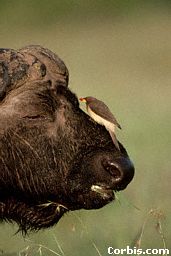

 People like to think that animals help
each other in nature, living in harmony and working for the common good. Scientists call
this mutualism. African red-billed oxpeckers, for example, eat ticks from oxen and other
large mammals, helping the animals while gaining a meal for themselves . . . or do they?
People like to think that animals help
each other in nature, living in harmony and working for the common good. Scientists call
this mutualism. African red-billed oxpeckers, for example, eat ticks from oxen and other
large mammals, helping the animals while gaining a meal for themselves . . . or do they?
New evidence suggests that the birds do not help their hosts, they actually harm them. Paul Weeks of Cambridge University studied Bonsmara oxen in Zimbabwe that were either exposed to or isolated from red-billed oxpeckers (Buphagus erythrorhynchus). When Weeks counted the number of ticks on the oxen, both groups had the same amount -- the oxpeckers were not helping remove ticks at all.
So what were the birds up to? Weeks observed them picking at wounds so that they could feed on the oxen's blood. And, when the oxpeckers did eat ticks, they preferred ticks that had already engorged themselves -- the damage to the livestock had already been done. The oxen were an oxpecker buffet, as the birds feasted on dead skin, mucus, saliva, sweat, tears, and earwax.
Scientists are now reexamining classic examples of mutualisms, finding the relationships to be more complex than previously thought. For example, new studies of tropical cleaner fish show that they do not just eat parasites from larger fish. Like oxpeckers, the cleaner wrasse feed on their host's flesh and blood. Surprisingly, the client fish seem to encourage the wrasse feeding -- studies show that the cleaner fish do remove many parasites. Although the red-billed oxpeckers do not greatly harm their hosts, there is no evidence yet that they are helpful.
Despite Paul Weeks's study, the long-standing myth that red-billed oxpeckers help their hosts by removing ticks prevails. Recently, 50 oxpeckers were released into the Shamwari Game Reserve in South Africa, partly to control ticks. Advertising campaigns also promote the benefits of red-billed oxpeckers for tick control. According to Weeks, it may take a while for attitudes about oxpeckers to change. "The traditional view is still pretty solid."
May 2000 (published in Equinox issue #112)
| Home | Chemistry | Physics | Astronomy | Biology | Ecology |
| Geography | Medicine | Mathematics | Technology |
| Issues | Scientists | General | Reference |
Last Updated Sunday, August 26, 2007 23:33 -0400
© Suzanne P. Currie 1999 [email protected]